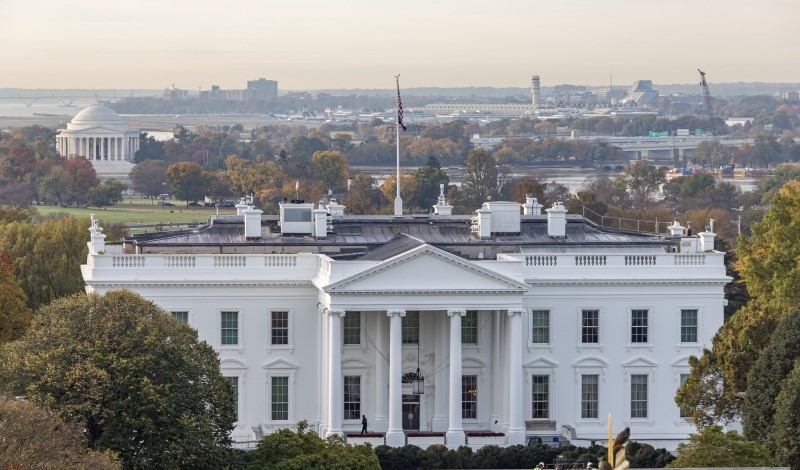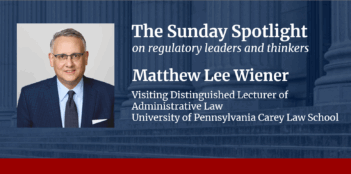
President Trump’s Project 2025 vision requires progressives to provide an equally compelling alternative.
It used to be that fights over the administrative state could be understood as part of the broader ideological war that defined the neoliberal era. If you were conservative and wanted “smaller government,” then getting rid of the administrative state was an essential part of that agenda. For those left of center who were willing to concede a more robust role for government in our society, then the administrative state was necessary for achieving that vision—even if only regrettably so.
But, with the advent of our new Project 2025 era, we are all “administrativists” now. That is because this Heritage Foundation-led transition plan now awaiting implementation by President Donald J. Trump notably departs from conservatives’ traditional commitment to “bringing about the deconstruction of the administrative state.” Instead, Mandate for Leadership—the behemoth document that lays out Project 2025’s policymaking blueprint in comprehensive detail—outlines an ambitious conservative policy agenda that is predicated on significant construction of the administrative state.
To be sure, Mandate for Leadership still contains plenty of that old-time deconstruction—such as the chapter on the Environmental Protection Agency. But its deconstructive recommendations are served up alongside novel calls for new and expanded regulatory programs—such as those granting overtime for workers who toil on the Sabbath. The policy blueprint also endorses the kind of expansive enforcement initiatives with little public accountability that conservatives used to make a point of opposing, such as reviving the Comstock Act to prevent people from mailing abortion medication even to states where its use is legally protected and instituting new immigration enforcement authorities. And sprinkled across its 30 chapters are plans to make muscular use of a wide variety of administrative tools—including contracting authority, state grants, and foreign aid—that once had been anathema to conservatives.
As it turns out, achieving Project 2025’s vision of a Christian nationalist, “anti-woke” society— both here in the United States and abroad—requires a lot of administrative capacity.
But that’s not all. The expansive administrative state that Project 2025 seeks to build is one that fits a distinctly authoritarian model. That means first and foremost a consolidation of political power in the President by eliminating the political insulation that independent agencies have long enjoyed and ending the Justice Department’s tradition of independence from the president.
It requires a significant erosion of constitutional checks and balances and federalism principles, including gutting congressional oversight through abuses of the Federal Vacancies Reform Act and the politicization of disaster aid to states. It thrives on the further privatization of essential government services, such veterans’ healthcare, primary education of children, and weather forecasts and alerts.
The most crucial element of all—the essential DNA of Project 2025, you might say—is its hostile disposition toward the rule of law. This disposition is best exemplified by the recommendation to reinstate Schedule F from the first Trump Administration, which would convert all career civil servants with policymaking responsibilities into at-will employees outside the protections of the merit-based civil service system. This new regime is, of course, necessary for the consolidation of political power in the President, as civil servants would be expected to pledge their loyalty to the President above their oath to uphold the law whenever the two conflicted. But it is also essential to the realization of the policy agenda set forth in Mandate for Leadership itself, much of which either flouts prevailing norms or outright violates existing laws.
Not incidentally, conservatives used to cite several of these concerns—notably, consolidated presidential power, separation of powers and federalism principles, and the rule of law—as part of their conventional broadsides against the administrative state.
Now that conservatives have learned to stop worrying and love the administrative state, it is high time that progressives update and refine their own vision of the administrative state as well. This means that in place of our longstanding reflexive, non-specific objections to conservative efforts to throttle the administrative state, we need to articulate an affirmative vision of what the administrative state should be and the role it ought to play in our society. Critically, this vision will need to be coherent, comprehensive, and compelling enough to distinguish it from Project 2025’s authoritarian vision and to set it out as a viable alternative to shape the broader policy discourse.
Progressives will also need to develop a compelling legal and policy rationale to support this vision—one that is bold but grounded in our widely shared values and aspirations. Meek, apologetic defenses will not suffice now any more than they did during the neoliberal era.
Finally, this vision must be one that can provide the foundation for a progressive regulatory reform agenda.
Recently, I took the first step in this effort by introducing a Statement of Principles for a Progressive Administrative State. This document lays out a vision of a robust, responsive, and inclusive administrative state that plays an essential and legitimate role in our constitutional system of government. Among other things, it calls on the administrative state to act as a custodian and agent of the rule of law and as a guardian against excessive concentrations of private political and economic power that threaten to destabilize our economy and democracy.
The Statement then sketches out a preliminary reform agenda for strengthening and rebuilding our administrative state—which is already admirably robust, responsive, and inclusive—so that it will more fully align with the progressive vision in practice.
With this Statement, of course, I hope to spur conversation among progressives working in the administrative law space, rather than end it.
It is important that we begin this work at once. Once the incoming Trump Administration begins instituting an agenda similar to Project 2025 it could further poison public attitudes against the administrative state. Indeed, libertarian commentators are already seizing the opportunity to make the fallacious case that Project 2025 somehow demonstrates that a robust administrative state is inherently authoritarian. Rebutting these claims will require demonstrating and defending the possibility of an administrative state that is democratic and people-centered.
More to the point, if we are to arrest the corrosive right-wing populism that is driving the turn toward illiberalism that Project 2025 and Trump’s recent reelection demonstrates, then we will need to begin rebuilding public trust and esteem for our governing institutions. I do not mean to suggest that public trust and esteem for our administrative state will be sufficient for achieving this goal, but it will be necessary and valuable from a strategic standpoint.




